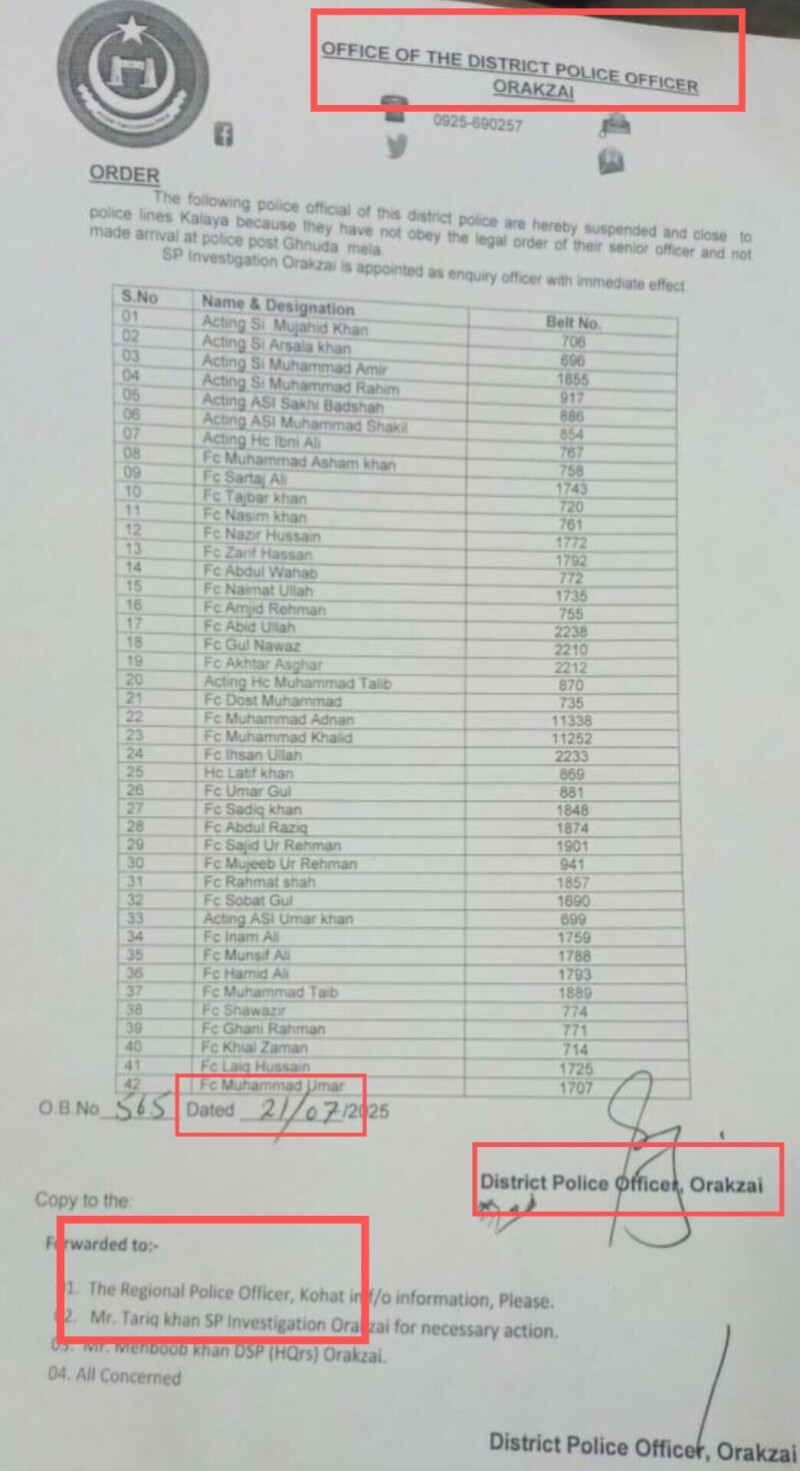Posts from users on social media platform X on Monday shared a notification, claiming it stated orders for the dismissal of Pashtun FC personnel for refusing to open fire on Pashtun civilians amid recent protests in Khyber Pakhtunkhwa. However, the notification was dated July 21 and not linked to the FC.
On Sunday, seven people were shot after a protest outside a military installation in Tirah took a violent turn. Hundreds of tribesmen had brought the body of a girl, who they claimed was killed in a mortar strike in the Darbar locality of Peer Mela in Zakhakhel a day earlier, to the Brigade Headquarters in Bagh-Maidan Markaz.
The situation turned violent when an angry mob, comprising mostly young men, ignored calls by local elders to remain calm. They first torched an excavator parked outside Brigade Headquarters, and then tried to force open the garrison’s main gate. Security personnel guarding the installation reportedly opened fire to control the crowd.
On Monday, an X user, who appeared to be a supporter of the rights group Pashtun Tahaffuz Movement from his previous posts and cover photo, shared a notification.
The caption of the post read: “In the FC, the Pashtuns who refused to fire on their fellow Pashtuns have been dismissed today. Praise to God, a considerable level of awareness has been achieved.”
The post did not clarify whether it was referring to the Frontier Corps or Federal Constabulary, as both forces are abbreviated as the FC and nor did it provide other contextual details such as the date, location and nature of the alleged incident when personnel refused to fire on.
The Frontier Corps is a group of four paramilitary forces officered by the Pakistan Army, while the Federal Constabulary is headed by officers from the Police Service of Pakistan.
The Frontier Corps is primarily involved in border management and counter-insurgency operations in Khyber Pakhtunkhwa and Balochistan. On the other hand, the Federal Constabulary is focused on maintaining law and order within the country.
The post gained 57,000 views and was shared more than 500 times.
Others also shared the document with the same claim as can be seen here, here and here.
A fact-check was initiated to determine the veracity of the claim due to its virality and keen public interest in the recent violence and unrest in KP.
The notification was dated July 21, seven days before the incident that took place in Tirah. The order on the notification stated: “The following police official of this district police are hereby suspended and close to police lines Kalaya because they have not obey the legal order of their senior officer and not made arrival at police post Ghunda mela.”
“SP Investigation Orakzai is appointed as enquiry officer with immediate effect,” it added.

The order was also issued by the Orakzai district police officer instead of the federal government or army.
Keyword and reverse image searches led to several news reports from Tribal News Network, GNN and 24 News HD published on July 23, which stated that the notification pertained to the dismissal of 42 policemen in KP who refused to report for duty during an anti-terror operation in the Ghunda Mela area.
According to a July 22 Dawn news report, at least eight security men were martyred and several others injured in two back-to-back attacks in the Orakzai tribal district on July 21, the same date as the notification.
It added that reports suggested security personnel clashed with assailants in the Ghunda Mela area. At least three militants were also killed in the engagement.
None of the reports from that period mentioned any instance of FC personnel refusing to open fire on civilians.
Therefore, the fact-check determined that the claim that a notification orders the dismissal of Pashtun FC personnel for refusing to open fire on people amid the current situation in KP is false. The notification was issued on July 21 and pertains to disciplinary action for police officers in Orakzai who refused to report for duty.
This fact check was originally published by iVerify Pakistan — a project of CEJ-IBA and UNDP.

